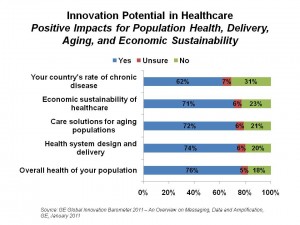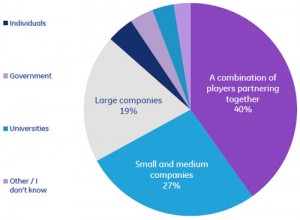 While innovation, writ large, is an engine for economic growth, it’s especially going to positively impact many aspects of health and health care, based on GE’s Global Innovation Barometer 2011.
While innovation, writ large, is an engine for economic growth, it’s especially going to positively impact many aspects of health and health care, based on GE’s Global Innovation Barometer 2011.
To prep for this week’s meeting of thought leaders at the World Economic Forum in Davos, Switzerland, GE surveyed 1,000 senior business executives in 12 countries in December 2010 and January 2011. Execs were surveyed from 12 countries including Australia, Brazil, China, Germany, India, Israel, Japan, S. Korea, Saudi Arabia, UAE, Sweden and the U.S.
While execs agree that virtually all aspects of citizens’ lives will be positively improved by innovation over the next 10 years, several bubble to the top – communications, health, environment, the job market, and transportation.
When it comes to health, as the chart shows, innovation’s positive impacts on health citizens’ lives translate along several dimensions: overall public health, health system design and delivery, caring for aging citizens, the economic sustainability of health care, and a nation’s chronic care burden. 
Health Populi’s Hot Points: While 87% of executives globally believe that innovation will improve health quality, most believe that innovation needs to be localized to serve specific market needs. Among all segments analyzed in this survey, this finding — that innovation can be tailored to local market needs — is highly relevant to health care. Most execs also concur that “great 21st century innovations will be those that bring value to society as a whole and not only to individual consumers or citizens.” Again, this speaks to innovation driving public health.
How to drive innovation, then, for health? The pie charts illustrates an important finding in the survey: a plurality of execs see that a combination of players partnering together will drive innovation more than individual companies (when it comes to individual companies, it’s small and medium sized companies that are seen to be more innovative than large organizations).
Partnering for health — whether through private “coopetition” tactics between commercial entities, or through private-public partnerships — will be required to address the challenges of health and health care in the 21st century in countries, both with developed with emerging economies. Health is multidimensional and goes beyond health care delivery – it’s about health system resources coupled with daily living choices and environmental factors, from the availability of green, fresh and healthy food to breathing clean air and accessing clean water; how public transportation and urban planning support community health; and, how public education bolsters literacy, health literacy, and job skills.
The survey finally asks what 3 countries are “leading innovation champions?” Two-thirds of execs surveyed identified the U.S., far and away the #1 innovative nation, followed by Germany and Japan (with 44% and 43% overall). China is fourth in line with 35% of execs identifying it as a top-3 innovator nation.
Two studies were published this month on the potential for the U.S. to lose its standing in health innovation from PwC (the Medical Innovation Scorecard) and the Council for American Medical Innovation. It appears the world’s senior business executives don’t see things quite that way.




 Interviewed live on BNN Bloomberg (Canada) on the market for GLP-1 drugs for weight loss and their impact on both the health care system and consumer goods and services -- notably, food, nutrition, retail health, gyms, and other sectors.
Interviewed live on BNN Bloomberg (Canada) on the market for GLP-1 drugs for weight loss and their impact on both the health care system and consumer goods and services -- notably, food, nutrition, retail health, gyms, and other sectors. Thank you, Feedspot, for
Thank you, Feedspot, for  As you may know, I have been splitting work- and living-time between the U.S. and the E.U., most recently living in and working from Brussels. In the month of September 2024, I'll be splitting time between London and other parts of the U.K., and Italy where I'll be working with clients on consumer health, self-care and home care focused on food-as-medicine, digital health, business and scenario planning for the future...
As you may know, I have been splitting work- and living-time between the U.S. and the E.U., most recently living in and working from Brussels. In the month of September 2024, I'll be splitting time between London and other parts of the U.K., and Italy where I'll be working with clients on consumer health, self-care and home care focused on food-as-medicine, digital health, business and scenario planning for the future...